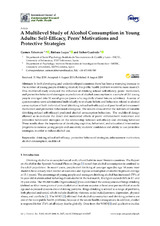A Multilevel Study of Alcohol Consumption in Young Adults: Self-E cacy, Peers’ Motivations and Protective Strategies
Autor
Tabernero Urbieta, Carmen
Cuadrado, Esther
Luque Salas, Bárbara
Editor
MDPIFecha
2019Materia
Drinking refusal self-efficacyProtective behavioral strategies
Enhancement motivation
Alcohol consumption
Multilevel
METS:
Mostrar el registro METSPREMIS:
Mostrar el registro PREMISMetadatos
Mostrar el registro completo del ítemResumen
In both developing and underdeveloped countries there has been a worrying increase in
the number of young people drinking alcohol; this public health problem warrants more research.
This multilevel study analyzed the influence of drinking refusal self-e cacy, peers’ motivation,
and protective behavioral strategies as predictors of alcohol consumption in a sample of 261 young
people arranged into 52 social groups (peers who regularly shared leisure activities). A series of
questionnaires were administered individually to evaluate beliefs and behaviors related to alcohol
consumption at both individual level (drinking refusal self-e cacy) and peer level (enhancement
motivation and protective behavioral strategies). The results showed that the individual variable
(drinking refusal self-e cacy) predicted alcohol consumption behaviors. The multilevel design
allowed us to evaluate the direct and moderated e ects of peers’ enhancement motivation and
protective behavioral strategies on the relationship between self-e cacy and drinking behavior.
These results show the importance of developing cognitive, behavioral, and educational intervention
programs to increase young people and university students’ confidence and ability to use protective
strategies, in order to reduce alcohol use

